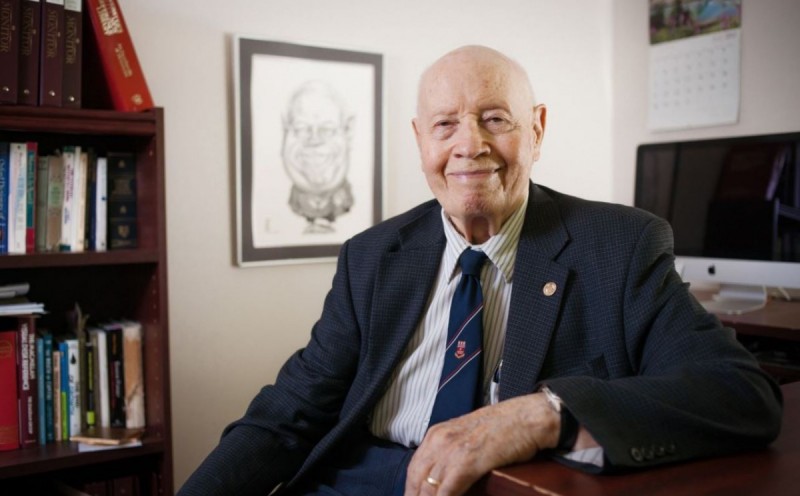Remembering Ed Finn

Ed Finn, trade unionist, editor and first leader of the NDP in Newfoundland and Labrador. Photo by Ben Welland.
Shortly after I began working at the Canadian Centre for Policy Alternatives in 1994, I had a meeting with its executive director, Bruce Campbell, and Ed Finn, who had recently retired from the Canadian Union of Public Employees and joined the staff of the CCPA. Bruce proposed the launch of a new magazine to monitor government and business, to be written by the three of us. This was the birth of the CCPA Monitor. When the first issue came out, Bruce and I had written pieces for it, but most of it had been produced by Ed—and, throughout his time as editor, it remained very much his publication.
He would come into the office in the morning, sit down at his word processor, and have typed out (with two fingers, like reporters in old movies) several articles by lunch time. They never contained typos or required revision.
Around that time, the CCPA began publishing a great many monographs and books. Ed edited almost all of them. On the side, he would also edit books and articles written by allies and published elsewhere than the CCPA. He was the ghost writer for many of the leading figures of the English-Canadian left. His productivity was quite simply phenomenal. Without it, the rise of the CCPA and a number of allied organizations would have been impossible, as would key projects, such as the Alternative Federal Budget or the CCPA’s crucial research on international trade.
Ed was brilliant at packaging arguments to support progressive campaigns. To name just one example, at a time when politics in Canada was gripped by deficit hysteria, he imagined and produced two seminal short publications to dispel it (in addition to all of his articles in the Monitor and elsewhere): The Deficit Made Me Do It and Ten Deficit Myths. Like other CCPA publications, large numbers of these booklets were sent to labour and allied organizations across Canada, putting a progressive political arsenal at the disposal of them all.
Ed was an extremely supportive colleague, a warm friend, and the nicest person you could hope to meet. Unfailingly generous, he always found time to help colleagues out and encourage them. Nobody can remember him ever raising his voice in anger. People who had never met him, but had read his uncompromisingly radical writing, would come to the CCPA office, expecting to meet a firebrand. Instead, they found a polite and kindly gentleman.
A perfect example of his radicalism was his article “Who do we try to rescue today?” where he imagined a scenario in which some people are busy ‘chucking’ other people into a river, while others, downstream, are busy pulling people out. Ed pointed out that the do-gooders who fished people out were doing a noble deed, but that it would be nobler and more effective to stop the people from being chucked into the water in the first place. In other words, applying palliatives to soothe the ills of corporate rule seems virtuous, but it would be much better to end capitalism once and for all.
To cite Ed’s simile, we do not blame viruses or cancer cells for their behaviour, but understand that it is in their natures. That does not stop us from doing our best to eradicate viruses and cancers. Yet, he pointed out, “we are doing virtually nothing to curb business depredations.” Consequently, “the corporate cancer is doing what comes naturally to all cancers,” i.e., “consuming their hosts.” The solution lies in a panoply of measures to wrest power from the corporations and create a just social order.
Ed often spoke of our “war of words” with corporate rule. The expression “war of words” sounds like a tempest in a teapot, a merely verbal struggle. But this is not how he meant it. In his view, we were in a class war, but we at the CCPA were fighting it with words—written, spoken, and always backed up by solid research.
Ed’s accomplishments were many and significant: linotype operator, reporter, principled newspaper editor, first provincial NDP leader in Canada, newspaper columnist, trade unionist, ghost writer of the English-Canadian left, and, especially, a person of unimpeachable integrity and principle. And that is the most important thing: while all of us at the CCPA marveled at his abilities and prodigious productivity, what marked us most was his kindness, patience, honesty, and integrity. I count it as a great honour and privilege to have been given the opportunity to be his colleague and friend.
After more than eight years with the CCPA, Paul Leduc Browne worked at the Université du Québec for nearly two decades. He is now staying at home.

